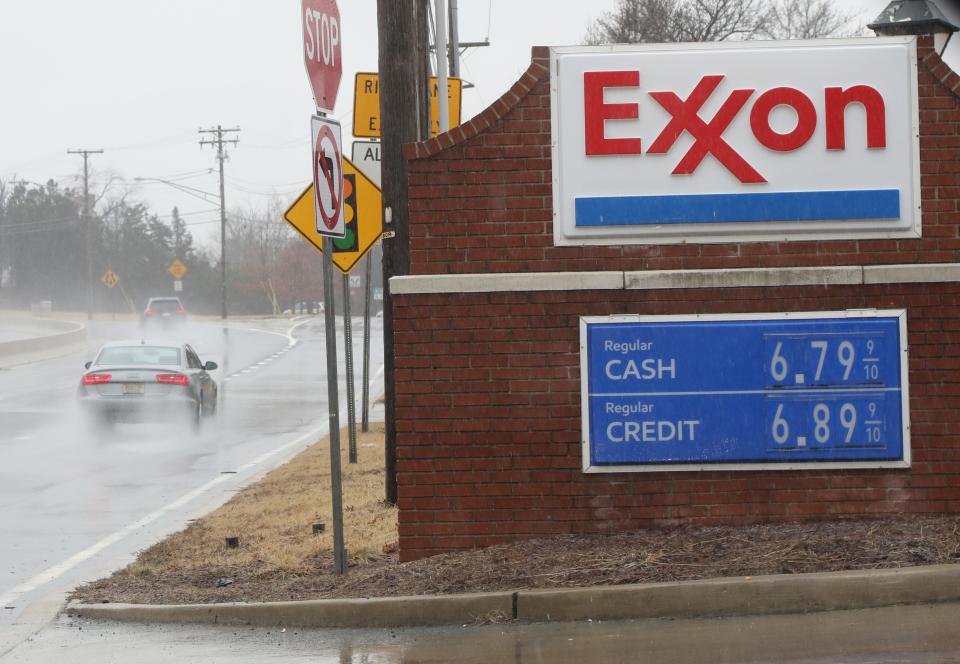The American energy crisis is one of our own making | Opinion
With gas prices climbing to highs never seen before, financial pain at the pump has been felt by millions of Americans across the country.
In New Jersey, we have seen the average cost of a gallon of gas rise to $4.38, breaking records and bank accounts across the Garden State. While many may be wondering when they might see lower prices, they should also question why America is not yet energy independent.
The answer, of course, is political.
In his recent announcement that the United States will ban oil and other energy imports from Russia in retaliation for its invasion of Ukraine, President Joe Biden said, “To protect our economy over the long term, we need to become energy independent.” While this sounds good on paper, in reality, this statement runs contrary to the actions of the president and his administration.
Federal officials in the White House and in Congress have made a series of poor energy policy decisions over the past two years that have now come back to bite them. First, there was the federal oil and leasing ban that slowed domestic energy production, hurting jobs and economies in communities across the country, including right here in New Jersey.
And while the president’s supporters like to tout that despite the ban, our country “produced more oil this past year than in President Trump’s first year,” this does not encompass all the facts.

In Trump’s third year in office, the U.S. became a net energy exporter for the first time since 1952, producing a record 4.5 billion barrels of oil which lowered energy costs and moved us forward on the path toward energy independence. But following the leasing ban announcement, production in 2021 decreased to 4.1 billion barrels.
Furthermore, delays and retractions in permits for key energy projects, such as canceling the Keystone XL pipeline, have also unquestionably decreased American energy production.
Keystone would have safely and securely transported oil from Canada, which maintains the third largest oil reserve in the world, into the U.S. By comparison, moving oil by trains and trucks is arguably a far less environmentally friendly option.
The Biden administration’s ambitious push for mass adoption of electric vehicles and clean energy also did not line up with reality, as supply chain woes and lack of infrastructure revealed that agenda to be unsustainable, thus placing an even greater emphasis on the importance of domestic oil and gas production.

In February, the German government officially suspended certification of the Nord Stream 2 natural gas pipeline and the Biden administration announced economic sanctions on the pipeline’s Russian-owned, Swiss-based parent company. The already constructed, but inoperative pipeline would have increased Russia’s natural gas export capacity directly to Germany. Its decertification will likely have global economic consequences.
Americans should not be forced to bear the burden of policy mistakes by the White House and their allies.
High costs at the pump can also lead to an increase in other consumer goods given the role that oil and gas play in supply chains, as well as the production of everyday products. Taking into account that the consumer price index has also risen to its highest levels in 40 years, action must be taken soon to swiftly rectify these missteps and actually protect the American economy. That starts with removing the roadblocks put forth by the Biden administration on domestic energy operations.
To start, the administration can expand the sale of federal oil and gas leases. While many federal officials have argued that oil and gas companies are “sitting” on 9,000 outstanding leases, they do not consider that not every approved lease produces oil and gas, nor that there is a current backlog of more than 4,500 lease applications waiting for approval and another 2,200 being litigated in court.
An abundance of readily available leases for production is never a bad thing, especially now when consumers are crying out for relief at the pump and with other energy costs like home heating oil. It is unfathomable and reckless to see the administration continue to point fingers at the energy industry or deflect blame for high prices on Russia’s aggressions abroad, rather than simply support domestic energy production.
President Biden ran on the notion that he would be straightforward and pragmatic with the American people, but when it comes to energy, he has not followed through. Instead, the actions of his administration have discouraged domestic oil and gas production and put our nation into a costly bind that is not expected to end anytime soon.
Constructing oil and natural gas pipelines within the U.S. has security, environmental and economic benefits. The federal government needs to recognize these factors and put aside their political agenda for every American.

Assemblyman Robert Auth represent parts of Bergen and Passaic counties in the 39th Legislative District.
This article originally appeared on NorthJersey.com: U.S. energy crisis is one of our making — pipelines are the future

